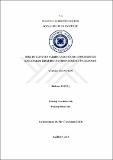DSpace Repository
ÖFKE DUYGUSUNUN SALDIRGAN DAVRANIŞA DÖNÜŞMESİNDE KİŞİLERARASI İLİŞKİ BOYUTLARININ ROLÜNÜN İNCELENMESİ
JavaScript is disabled for your browser. Some features of this site may not work without it.
| dc.contributor.author | Toptaş, Muhsine
|
|
| dc.date.accessioned | 2019-06-01T10:37:47Z | |
| dc.date.available | 2019-06-01T10:37:47Z | |
| dc.date.issued | 2018 | |
| dc.identifier.uri | http://hdl.handle.net/11547/2397 | |
| dc.description.abstract | Bu araştırmanın amacı, üniversite öğrencilerinin öfke ve saldırganlık tepkileri ile kişilerarası ilişki boyutları arasındaki ilişkinin incelenmesidir. Araştırmanın çalışma evrenini, 2016-2017 eğitim öğretim yılında İstanbul Aydın Üniversitesi’ne bağlı Fen Edebiyat, Sağlık Bilimleri, Eğitim ve Mühendislik Fakültesi’nin farklı bölümlerinden tabakalı örnekleme yöntemi ile seçilen 257’si kız, 223’ü erkek olmak üzere toplam 480 öğrenci oluşturmaktadır. Araştırmaya katılan öğrencilerin bazı kişisel bilgileri için “Kişisel Bilgi Formu”, öfke ve saldırganlık puanlarının belirlenmesi amacıyla “Öfkeye İlişkin Derin Düşünme Ölçeği” ve “Saldırganlık Envanteri” ile kişilerarası ilişki boyutları arasındaki ilişkinin belirlenebilmesi amacıyla “Kişilerarası İlişki Boyutları Ölçeği”, kullanılmıştır. Verilerin analizinde Bağımsız Örneklem, T-testi, ANOVA, Çoklu Regresyon Analizi ve Aracı Değişken Analizi kullanılmıştır. Araştırma sonucunda üniversite öğrencilerinin öfke, saldırganlık ve kişilerarası ilişki boyutları ile cinsiyet, bölüm, sorun paylaşımı, çocukken aile içi şiddete maruz kalıp kalmama ve bazı sosyo-demografik değişkenler arasında anlamlı farklılıklar bulunmuştur. Araştırmanın regresyon analizi sonucuna göre; öğrencilerin öfke duyguları ile fiziksel, sözel saldırganlık alt boyutları ve başkalarına güven alt boyutu arasında pozitif yönde anlamlı bir ilişki olduğu; onay bağımlılık alt boyutunda ise negatif yönde anlamlıbir ilişki olduğu görülmüştür. Çocukken anne ve/veya babaları tarafından aile içi şiddete maruz kalan öğrencilerin, şiddete maruz kalmayan öğrencilere göre öfke duygusunu daha yoğun yaşadıkları tespit edilmiştir. Araştırmanın aracı değişken analizi sonucuna göre ise, fiziksel saldırganlık davranışının ortaya çıkmasında intikam düşünceleri ile duygu farkındalığının birlikte güçlü bir etki yarattığı ve öğrencilerde görülen fiziksel saldırganlık davranışını açıkladığı görülmektedir. | tr_TR |
| dc.language.iso | tr | tr_TR |
| dc.publisher | İSTANBUL AYDIN ÜNİVERSİTESİ SOSYAL BİLİMLER ENSTİTÜSÜ | tr_TR |
| dc.subject | Öfke | tr_TR |
| dc.subject | Saldırganlık | tr_TR |
| dc.subject | Aile İçi Şiddet | tr_TR |
| dc.subject | Kişilerarası İlişki Boyutları | tr_TR |
| dc.subject | Anger | tr_TR |
| dc.subject | Aggression | tr_TR |
| dc.subject | Domestic Violence | tr_TR |
| dc.subject | Dimensions of Interpersonal Relationship | tr_TR |
| dc.title | ÖFKE DUYGUSUNUN SALDIRGAN DAVRANIŞA DÖNÜŞMESİNDE KİŞİLERARASI İLİŞKİ BOYUTLARININ ROLÜNÜN İNCELENMESİ | tr_TR |
| dc.type | Thesis | tr_TR |
| dc.description.abstractol | The aim of this research is to investigate the connection between dimensions of interpersonal relations and transformation of feeling of anger into aggressive behavior. Research population consisted of totally 480 students, including 257 females and 223 males, selected through stratified sampling from different departments of Arts and Sciences, Health Sciences, Education, and Engineering Faculties, Istanbul Aydin University, during academic year 2016-2017. For some personal information of students “Personal Information Forms;” for determining the score of anger and aggression “Anger Rumination Scale,” and “Aggression Inventory”; and for determining the connection between dimensions of interpersonal relations, “Dimensions of Interpersonal Relationships Scale” were used. Unpaired t-test, Anova Analysis, Multiple Regression Analysis and Moderation Analysis were used to analyze the specified data. As a result of research, meaningful differences were found between such as students’ anger, aggression, interpersonal relations dimensions and gender, department, problem-sharing, whether exposed to domestic violence during childhood or not, and some socio-demographic variables. It was concluded from regression analysis that, there was a positive meaningful relation between students’ feeling of anger and the sub-dimensions of physical and verbal aggression and sub-dimension of trusting others; and there was negative meaningful relation with sub-dimension of approval addiction. It was identified that the students, who were exposed to domestic violence during childhood, experienced a more intense and prolonged feeling of anger than the other students. Also moderation analysis was made to examine the influence of interpersonal relationships dimensions on aggression. According to the result of this analysis, combination of revenge thought and feeling awereness had a strong influence in unison and clarify on the occurence of physical aggression of students. | tr_TR |
| dc.publisher.firstpagenumber | 1 | tr_TR |
| dc.publisher.lastpagenumber | 197 | tr_TR |
Files in this item
This item appears in the following Collection(s)
-
Tezler -- Thesis [3451]
